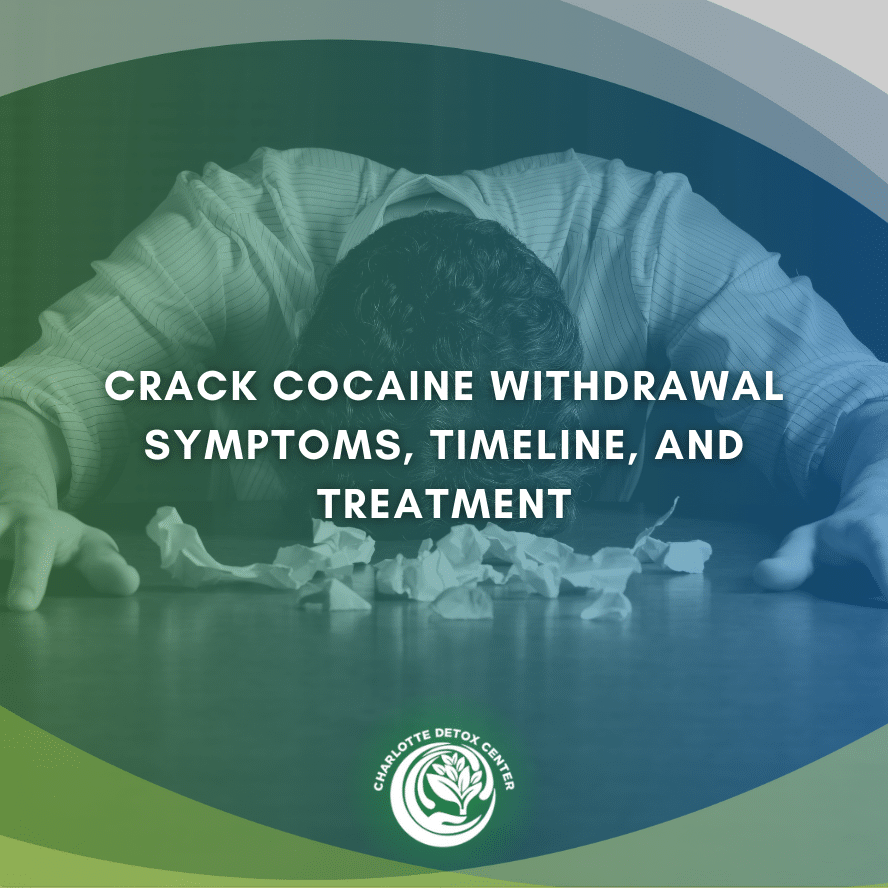Crack Cocaine Withdrawal Symptoms, Timeline, and Treatment

Medically Verified: 2/1/24
Medical Reviewer
Chief Editor

All of the information on this page has been reviewed and verified by a certified addiction professional.
Crack cocaine is a powerful and addictive stimulant drug. It is a potent form of cocaine that changes the way a person’s body and brain function. People who use it are at great risk of developing an addiction to the drug.
When a person attempts to stop using crack cocaine, they are likely to experience a range of uncomfortable withdrawal symptoms. Some of these symptoms can be so uncomfortable that they may start using crack cocaine again to avoid them. Most people also experience cravings for crack cocaine, often for a long time after they stop using it. This can lead many people to have a relapse after a period of abstinence from the drug.
The psychological and physical symptoms that happen during crack cocaine withdrawal can make it very difficult to stop using it without professional support and treatment. If you or someone you love is abusing crack cocaine, you must get treatment, starting with a crack cocaine treatment and detox program.
The caring specialists at Charlotte North Carolina Detox know that people can overcome substance abuse and addiction if they have the treatment they need. Don’t wait another day to start treatment. Get the help you need today.
Symptoms of Crack Cocaine Withdrawal
Crack cocaine withdrawal can happen in two stages: the acute stage and protracted withdrawal syndrome (PAWS). Not everyone develops PAWS, but most people have symptoms associated with acute withdrawal from crack cocaine.
Acute
The acute symptoms of crack cocaine withdrawal include:
- Anxiety
- Nightmares
- Depression
- Fatigue
- Impaired concentration
- Mood swings
- Poor sleep
For many people, the psychological and physical symptoms of acute withdrawal are so uncomfortable that they quickly relapse.
PAWS
Protracted withdrawal syndrome (PAWS) describes lingering withdrawal symptoms that can last for months after a person stops using crack cocaine. These symptoms include:
- Shakiness
- Anxiety
- Depression
- Insomnia
- Low libido
- Emotional volatility
- Poor sleep
- Intense cravings
The discomfort of withdrawal and the intensity of the cravings can result in a relapse. People who develop PAWS may require additional treatment or support to avoid a relapse.
Crack Cocaine Withdrawal Timeline
A person’s withdrawal timeline depends on several factors, including the length and severity of their drug abuse and biological factors. Generally, people begin having symptoms of withdrawal within 30 minutes to 3 days of their last use. The acute stage of withdrawal lasts for several weeks, but withdrawal can last for one to three months.
After three weeks of withdrawal symptoms, a person is thought to have developed protracted withdrawal syndrome (PAWS). Someone who develops PAWS may have symptoms that last for six months or more.
While withdrawal can vary from person to person, symptoms tend to follow a general timeline.
Days 1-3
Symptoms are the worst for many people during the first few days. People may experience body aches, paranoia, anxiety, irritability, cravings, and fatigue.
Days 3-7
Some symptoms disappear, but many people experience interrupted sleep, significant depression, fatigue, and irritability.
Week 2
Most physical symptoms have passed, but people can experience severe depression and intense cravings. Without treatment, people can relapse.
Weeks 3-4
At this point, many people will still have strong cravings. Mood swings and severe depression are common as the weeks go on.
Crack cocaine withdrawal can be very difficult and relapse is common. For the best chance of a safe, complete detox from crack cocaine, you must go through withdrawal with supervision and support. The best place to go through crack cocaine withdrawal is a medical drug detox program.
Starting a Crack Cocaine Detox Program
Crack cocaine withdrawal can be very difficult because of the physical and psychological symptoms that are associated with it. People in withdrawal from crack cocaine require around-the-clock support and supervision to ensure their safety and to be able to avoid relapse when cravings are intense.
In a medically supervised crack cocaine detox program, people are monitored and treated for their withdrawal symptoms. In many cases, this includes taking medications. During crack cocaine detox, people may take medications that treat their mental health symptoms and help them sleep. These medications include:
- Valium
- Seroquel
- Gabapentin
- Trazadone
- Propranolol
People may also participate in other healing treatments that help keep them calm and comfortable during the detox process.
After a complete detox, people must participate in an addiction treatment program that can give them the skills and support they need to live a healthy, sober lifestyle. Addiction treatment is offered in many levels of care and a variety of settings, including inpatient, outpatient, and partial hospitalization programs.
Learn More About the Crack Cocaine Detox Program at Charlotte North Carolina Detox
If you or someone you love require the support of a crack cocaine detox to overcome addiction, you are not alone. Reach out to the staff at Charlotte North Carolina Detox to learn about how we can support you in your recovery from addiction.
Don’t wait another day for the treatment you need. Call today to get started.
